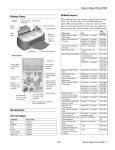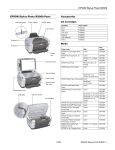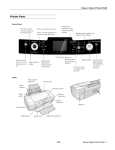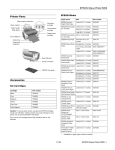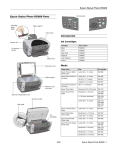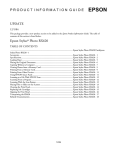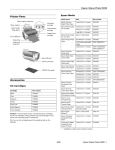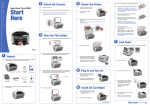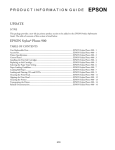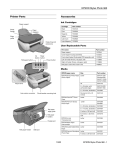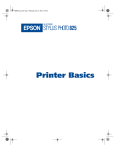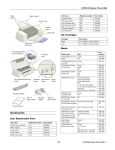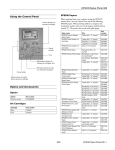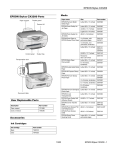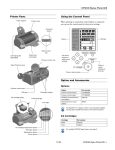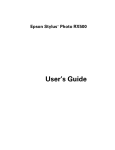Download Epson Stylus Photo R300M - Ink Jet Printer Specifications
Transcript
EPSON Stylus Photo R300 Series EPSON Papers Printer Parts When printing from your computer using the EPSON printer driver, you can choose from any of the following EPSON papers. When printing without a computer (in stand-alone mode), select one of the papers marked with an asterisk (*). The printer also works with plain paper. ® Printer Paper support extension Paper support Printer cover Control panel Memory card cover Output tray extension Size Part number EPSON Premium Bright White Paper EPSON Photo Quality Ink Jet Paper Letter (8.5 x 11 inches) S041586 Letter (8.5 x 11 inches) A4 (8.3 x 11.7 inches) Legal (8.5 x 14 inches) A6 (4.1 x 5.8 inches) S041062 S041061 S041067 S041054 Panoramic (8.3 x 23 inches) Borderless 4 x 6 inches, non-perforated* 4 x 6 inches, perforated edges Letter (8.5 x 11 inches)* S041145 EPSON Photo Quality Ink Jet Cards EPSON Photo Paper EXT I/F USB port Output tray Paper name EPSON Glossy Photo Paper Control Panel LCD screen Choose Basic or Advanced mode Choose menu settings Advanced EPSON ColorLife Photo Paper EPSON Matte Paper Heavyweight Custom Direct Save Stop OK Back Return to previous menu or cancel menu selection Letter (8.5 x 11 inches)* S041134/ S041671 S041141/ S041649/ S041272/ S041271 S041500 Borderless 8 x 10 inches* Letter (8.5 x 11 inches)* Letter (8.5 x 11 inches) S041467 S041257 S041568 Letter (8.5 x 11 inches)* Borderless 4 x 6 inches* Borderless 5 x 7 inches* Borderless 8 x 10 inches* Letter (8.5 x 11 inches)* S041286/ S041667 S041682 S041464 S041465 S041331 Letter (8.5 x 11 inches)* S041405 A4 (8.3 x 11.7 inches) S041106 Letter (8.5 x 11 inches) S041064 Letter (8.5 x 11 inches)* S041153 Letter (8.5 x 11 inches), perforated edges* A6 (4.1 x 5.8 inches) S041606 Save custom Advanced settings Basic Power Print Save photos to external disk or CD-R EPSON Double-Sided Matte Paper EPSON Premium Glossy Photo Paper Cancel control panel settings or stop printing and cancel print job EPSON Premium Semigloss Photo Paper EPSON Premium Luster Photo Paper EPSON Photo Quality Self Adhesive Sheets EPSON Ink Jet Transparencies EPSON Iron-On Transfer Paper EPSON Glossy Photo Greeting Card Kit EPSON Photo Stickers Kit (CD-ROM/paper) EPSON Photo Stickers (refill) EPSON Semigloss Scrapbook Photo Paper PremierArt Matte Scrapbook Photo Paper for Epson Start printing Press and hold for 3 sec. to turn on the printer Go to next menu or choose menu selection Press to replace ink or perform printer maintenance Accessories Ink Cartridges Cartridge Part number Black T048120 Magenta T048320 Cyan T048220 Yellow T048420 Light Magenta T048620 Light Cyan T048520 10/03 S041458 A6 (4.1 x 5.8 inches)* S041144KIT S041144 Letter SCR1001 Letter SCR1002 EPSON Stylus Photo R300 Series - 1 EPSON Stylus Photo R300 Series Safety Approvals Printer Specifications Printing Nozzle configuration 540 nozzles (90 each: black, cyan, magenta, yellow, light cyan, light magenta) Safety standards UL 1950, CSA C22.2 No. 950 EMI FCC part 15 subpart B class B CSA C108.8 Class B Ink Cartridges Specification Black ink cartridge Color ink cartridge Print direction Bidirectional with logic seeking Color(s) Black Cyan, Magenta, Yellow, Light Cyan, Light Magenta Control code ESC/P Raster, EPSON Remote command Ink yield* Input buffer 32KB 450 pages at 5% coverage; 630 pages at 3.5% coverage 430 pages at 5% coverage each color Cartridge life 2 years from production date (if unopened) (within 6 months after opening package, at 77 °F [25 °C]) Storage temperature −4 to 104 °F (−20 to 40 °C) 1 month at 104 °F (40 °C) Transit temperature −22 to 140 °F (−30 to 60 °C) 1 month at 104 °F (40 °C) 120 hours at 140 °F (60 °C) Mechanical Paper capacity 2 120 sheets of 24 lb (90 g/m ) paper Dimensions Storage Width: 19.6 inches (498 mm) Depth: 10.4 inches (264 mm) Height: 8.9 inches (225 mm) Printing Width: 19.6 inches (498 mm) Depth: 18.7 inches (476 mm) Height: 11.4 inches (289 mm) Weight Dimensions 13.2 lb (6.0 kg) without ink cartridges Electrical Specification 120 V Model 220−240 V Model Input voltage * 99 to 132 V 198 to 264 V Rated frequency 50 to 60 Hz Input frequency 49.5 to 60.5 Hz Rated current Freezing 3.2 °F (−16 °C) temperature** 0.4 A ** Ink thaws and is usable after approximately 3 hours at 77 °F (25 °C). Epson recommends the use of original Epson ink cartridges only. Products not manufactured by Epson may cause damage to your printer and will not be covered by Epson’s warranties. Power consumption Approx. 13 W (ISO10561 Letter Pattern) Approx. 3 W in standby mode Do not use an ink cartridge if the date on the cartridge has expired. * Check the label on the back of the printer for your printer’s voltage. Do not refill ink cartridges. The printer calculates the amount of ink remaining using an IC chip on the ink cartridge, so even if the cartridge is refilled, the IC chip will report that it is empty. Environmental Temperature 50 to 95 °F (10 to 35 °C) Storage* −4 Transit* –4 to 140 °F (–20 to 60 °C) 120 hours at 140 °F (60 °C) to 104 °F (−20 to 40 °C) 1 month at 104 °F (40 °C) Humidity (without condensation) Operation 20 to 80% RH Storage* 5 to 85% RH *Stored in shipping container 2 - EPSON Stylus Photo R300 Series 1.9 × 2.4 × 1.5 inches (W × D × H) 49.1 × 60 × 38.5 mm (W × D × H) * The figure given is based on continuous printing after ink replacement. Cartridge yields will vary with images printed, print settings, paper types, and frequency of use. 0.2 A Operation 0.8 × 2.4 × 1.5 inches (W × D × H) 20.1 × 60 × 38.5 mm (W × D × H) −0.4 °F (−18 °C) 10/03 EPSON Stylus Photo R300 Series Selecting the Media or Paper Type Setting Borderless Photos BorderFree printing is available for a variety of paper types and sizes, whether you’re printing from your computer or in stand-alone mode. ™ When printing from your computer, select the following paper Type/Media Type settings in the driver software. Media Type settings supported by printer driver software Paper Media Type setting Plain paper sheets or envelopes EPSON Iron-On Transfer Paper Plain paper EPSON Premium Bright White Paper Bright White Paper When printing from your computer, BorderFree printing supports the following paper types and sizes: EPSON Photo Quality Ink Jet Paper Photo Quality Ink Jet Paper EPSON Photo Quality Ink Jet Cards EPSON Photo Quality Self Adhesive Sheets EPSON Matte Paper Heavyweight EPSON Double-Sided Matte Paper PremierArt Matte Scrapbook Photo Paper for Epson Matte Paper Heavyweight EPSON Photo Paper Photo Paper EPSON Glossy Photo Paper EPSON Photo Quality Glossy Paper EPSON Glossy Photo Greeting Cards Glossy Photo Paper EPSON Premium Glossy Photo Paper EPSON Photo Stickers Premium Glossy Photo Paper EPSON Premium Luster Photo Paper Premium Luster Photo Paper EPSON Premium Semigloss Photo Paper EPSON Semigloss Scrapbook Photo Paper Premium Semigloss Photo Paper EPSON Photo Quality Glossy Film Photo Quality Glossy Film EPSON Ink Jet Transparencies Ink Jet Transparencies EPSON ColorLife Photo Paper ColorLife Photo Paper Paper name Letter size 4×6 5×7 8 × 10 Glossy Photo Paper ✓ ✓ — — Premium Glossy Photo Paper ✓ ✓ ✓ ✓ Premium Semigloss Photo Paper ✓ — — — Premium Luster Photo Paper ✓ — — — Matte Paper Heavyweight ✓ — — ✓ When printing without a computer (in stand-alone mode), select the following Paper Type settings from the printer’s control panel: Paper Type settings supported in stand-alone mode Paper Paper Type setting Plain paper Plain EPSON Photo Paper EPSON Glossy Photo Paper GlossyPhoto EPSON Premium Glossy Photo Paper Prem.Glossy EPSON Premium Semigloss Photo Paper EPSON Semigloss Scrapbook Photo Paper Semigloss EPSON Premium Luster Photo Paper Prem.Luster EPSON Matte Paper Heavyweight PremierArt Matte Scrapbook Photo Paper for Epson Matte EPSON ColorLife Photo Paper ColorLife EPSON Photo Stickers Stickers EPSON Iron-On Transfer Paper Iron-on EPSON Glossy Photo Greeting Cards Greeting 10/03 EPSON Stylus Photo R300 Series - 3 EPSON Stylus Photo R300 Series Media Loading Guidelines ❏ See page 1 for a list of EPSON papers that can be used with this printer. Printable area A B-L A B-R B-L B-R C ❏ Except for envelopes, load paper short edge first, even when printing landscape-oriented pictures. Load envelopes flap edge first with the flap side down. envelopes C single sheets/index cards ❏ Always handle sheets by the edges, and don’t touch the printable surface. ❏ Be sure to load the printable (whiter) side of the media face up in the sheet feeder. ** no margins (4 × 6, 5 × 7, 8 × 10, and letter-size only) ❏ Do not load paper higher than the arrow mark on the left edge guide. (Some papers should be loaded just one sheet at a time.) ❏ In addition to the Media Type (or Paper Type) setting, remember to select the correct Paper Size for your media. ❏ If the special media has protective sheets between each sheet of media, be sure to remove the protective sheets before printing. ❏ Some special media have a cut corner that you need to position in the upper right when loading. Since the quality of any particular brand or type of paper may be changed by the manufacturer at any time, EPSON cannot attest to the quality of any non-EPSON brand or type of paper. Always test samples of paper stock before purchasing large quantities or printing large jobs. A:The minimum top margin is 0.12 inch (3.0 mm). When loading multiple sheets of EPSON Photo Quality Glossy Film, the minimum top margin is 1.2 inches (30.0 mm). B-L: The minimum left margin is 0.12 inch (3.0 mm). B-R: The minimum right margin is 0.12 inch (3.0 mm) for all papers except DL envelopes (0.28 inch [7.0 mm]) and No. 10 envelopes (1.10 inches [28.0 mm]). C: The minimum bottom margin is 0.55 inch (14.0 mm). * You can extend the minimum bottom margin to 0.12 inch (3.0 mm) by selecting Maximum as the Printable Area setting. However, print quality may decline in the expanded area. ** When printing with the No Margins setting, print quality may decline in the top and bottom areas of the printout and some of the image will be cropped. Poor quality paper may reduce print quality and cause paper jams and other problems. If you encounter problems, switch to a higher grade of paper. Do not load curled or folded paper. Use papers under these conditions: Temperature: 59 to 77 °F (15 to 25 °C) Humidity: 40 to 60% RH Store printouts on Photo Quality Glossy Film and Self Adhesive Sheets under these conditions: Temperature: 59 to 86 °F (15 to 30 °C) Humidity: 20 to 60% RH 4 - EPSON Stylus Photo R300 Series 10/03 EPSON Stylus Photo R300 Series Loading CDs and DVDs Printing Without a Computer Follow these steps to load CDs and DVDs in your printer. Your EPSON Stylus Photo R300 Series printer can print photos stored: If you don’t insert the CD/DVD tray correctly, you may damage the printer or tray. 1. Lift the printer lid and push in the output tray extension, then lower the CD/DVD tray guide. ❏ On a memory card (see below) ❏ In a digital camera (see page 6) ❏ On a data storage device, such as a CD-R drive or an Iomega Zip drive (see page 6) ® ® ❏ On a Bluetooth -enabled device with the optional Bluetooth Photo Print adapter ® Lower tray guide However your photos are stored, make sure the image files meet these requirements: ❏ JPEG files or uncompressed Tiff files only ❏ The file storage device should comply with DCF (Design rule for Camera File systems) Version 1.0 2. Place the CD or DVD on the tray, making sure the disc lays flat in the tray. ❏ Resolutions ranging from 160 × 160 to 4600 × 4600 pixels 3. Insert the tray carefully, making sure it is level, not tilted up or down. Inserting a Memory Card ❏ No more than 999 images (although you may have additional images on your card or storage device, the printer can read only the first 999) Your printer works with many types of memory cards. Follow these guidelines to insert your memory card: Push the tray under the tab and the two rollers. Don’t push in the tray too far; line up the arrows exactly. Tab 1. Make sure the printer is turned on, open the memory card cover, then insert the memory card into the appropriate slot, as shown: Arrows Keep tray level See the User’s Guide for more information on printing CDs and DVDs. ™ CompactFlash ™ or Microdrive (left) ® Memory Stick , SD (Secure Digital), or MMC (MultiMediaCard) (middle) ™ SmartMedia or xD Picture Card (right) 2. Close the memory card cover. After a moment, the printer reads and counts the number of images on your card. When it’s done, your images are available for printing. Insert just one card at a time. The printer can’t read multiple cards at once. 10/03 EPSON Stylus Photo R300 Series - 5 EPSON Stylus Photo R300 Series Removing a Memory Card When you’re finished printing from a memory card, make sure the light below the card slot is not flashing before you remove it. 2. Connect the USB cable from your camera or data storage device to the EXT I/F USB port on the front of the printer. Some digital cameras require a special USB cable; if so, be sure to use the one that came with the camera. Do not eject a card while the processing light is flashing, or you may lose data on the card. To remove a card, pull the card straight out of the slot. Connecting a Digital Camera or External Storage Device If you have one of the following devices, you can connect it directly to your printer using a USB cable: ❏ Digital camera with PictBridge or USB DP support ❏ USB CD/DVD burners and drives (selected drives: see http://support.epson.com for a list of compatible drives), USB 2.0 (high-speed) drives are recommended ❏ 100 or 250MB Iomega Zip drive, AC or USB powered 3. Turn on the printer and your camera or data storage device. After a moment, the printer reads and counts the number of images on your device. When it’s done, you see a screen similar to this on the printer’s control panel and your images are available for printing: ❏ Memory cards with a commercially available USB adapter (such as the MicroTech ZiO! ). ™ ❏ MO (Magneto-Optical) drives If you’re not sure about your camera or drive, you can try connecting it. If it’s not compatible, you’ll see a screen saying that the connected device cannot be used. EPSON cannot guarantee the compatibility of any cameras or drives. If you are using a Zip disk, it must be formatted as a FAT16 disk. Also, if you insert a Macintosh disk into a Zip drive attached to the printer, it automatically formats it, so be sure to use a disk that is empty or not formatted, or one containing data you don’t mind losing. (You will be prompted before any data is erased.) When you connect a CD-drive, you can also print photos from Picture CDs that you get from your photo lab. When you connect a digital camera or storage device, the printer treats it like a memory card. Follow these steps to connect it: 1. Remove any memory cards from the printer. If you’ve backed up your images on Zip disk, CD, or another storage device, they’re stored in folders (001, 002, etc.). Use the and buttons on the printer’s control panel to highlight the folder you want to open, then press OK to open it. Choosing Basic Mode or Advanced Mode You can select Basic mode to quickly create 4 × 6-inch photo prints using EPSON Premium Glossy Photo Paper. Advanced mode lets you print with any paper type and size that is available, and lets you change quality settings and make other adjustments to your photos. You can also use Advanced mode to perform maintenance functions from your printer’s control panel. All the features described in this book require the printer to be set to the Advanced mode. To use Basic mode, see the Quick Reference guide. (If you leave a card in the printer, images will be read from the card instead of your camera or external storage device.) Press to choose Basic or Advanced 6 - EPSON Stylus Photo R300 Series 10/03 EPSON Stylus Photo R300 Series If you would prefer to print an index print with larger images, choose All under the Select Photo menu, then choose a different layout setting. Selecting Photos for Printing Before selecting the photos you want to print, make sure you have inserted your memory card or connected your camera or external device to the printer. See page 6. ❏ If you have the EPSON Stylus Photo R300 printer, start by printing an index, so you can select your photos by number. If you have the EPSON Stylus Photo R300M printer, you can use the preview monitor to easily select your photos. Once you know which photos are available for printing, you can select a single photo, a set of photos, a range of photos or all the photos. Selecting One Photo You can select a photo, then print one or more copies of it on a page using a variety of layouts. With the Copies option, you can print up to 100 copies of your selected layout. If your printer doesn’t have the preview monitor, first print an index to identify the photos on the memory card (as described on page 8). 1. Highlight Select Photo, then press OK. ❏ If you’ve used your camera’s PictBridge or DPOF (Digital Print Order Format) feature to select the photos you want to print, you won’t have to print an index. When you insert the camera’s memory card, PictBridge or DPOF appears under the Select Photo menu and your photos are automatically selected. (If you don’t want to use PictBridge or DPOF, you can choose your photos manually.) 2. In the Select Photo menu, use the and buttons to highlight the number of the photo you want to print, then press OK to select it. Printing an Index 3. If you want to print more than one copy of this photo, highlight Copies and press OK, then use the and buttons to select the desired number of copies and press OK. An index print shows small, numbered images of all the photos on your memory card—and includes the date each picture was taken. This enables you to select the photos you want to print. If you have the EPSON Stylus Photo R300M printer with the preview monitor, you may not need to print an index. 1. Load your paper in the printer. 2. Highlight Select Photo, then press OK. 3. In the Select Photo menu, use the and highlight Index, then press OK to select it. buttons to 4. Continue with “Printing the Selected Photos” on page 8 to finish laying out your photos and setting up your print job. Selecting a Set of Photos You can select two or more photos, then print them as a group using a variety of layouts. If you’ve selected more photos than can fit on a page, the printer automatically prints additional pages, using the same layout. If you don’t have the optional preview monitor, first print an index to identify the photos on the memory card. 1. Highlight Select Photo, then press OK. 4. Press the and buttons to highlight Paper Type, then press OK to enter the Paper Type menu. 5. Highlight the type of paper you’ve loaded, then press OK. (If you’re not sure about the paper type, see the table on page 3.) It’s important to select the correct Paper Type setting for the paper you’re using, or the print quality may not be what you expect. 6. Enter the Paper Size menu, then select the size of paper you’ve loaded. 7. Press the Print button. Your index starts printing. If you want to print all your photos, select All. To print a range of photos, see page 8. 2. Use the button to highlight Individual, then press OK. If you have the preview monitor, it displays the first photo on your card. 3. Use the and buttons to select the photo you want to print, then press OK. 4. If you want to print more than one copy of this photo, use the and buttons to select the desired number of copies, then press OK. 10/03 EPSON Stylus Photo R300 Series - 7 EPSON Stylus Photo R300 Series 5. Repeat steps 3 and 4 for each additional photo you want to print. 6. When you’re done, press Back. 3. Highlight the type of paper you’ve loaded, then press OK. (If you’re not sure about the paper type, see the table on page 3.) 7. To view a list of your selected photos, highlight Copies and press OK. Press Back when you’re done viewing the list. If you made a mistake and selected the wrong photo, you can remove it from the list of selected photos. Simply change its number of copies to zero; see step 4. 8. Continue with “Printing the Selected Photos” to finish laying out your photos and setting up your print job. It’s important to select the correct Paper Type setting for the paper you’re using, or the print quality may not be what you expect. 4. Enter the Paper Size menu, then select the size of paper you’ve loaded. 5. In the Layout menu, select one of the following: Prints one photo per sheet, borderless; fits the photo lengthwise on the paper. Selecting a Range of Photos Prints one photo per sheet, with borders around the edges. You can select a range of photos to print if you took a set of photos that you want to print out at once. Prints a photo on the top half of the sheet. If your printer doesn’t have the preview monitor, first print an index to identify the photos on the memory card. Prints two photos per sheet. Prints four photos per sheet. 1. Highlight Select Photo, then press OK. Prints eight photos per sheet. 2. Highlight Range, then press OK. 3. Choose a starting photo under the From: option using the and buttons. (Hold down either button to scroll quickly through the photo numbers.) Prints 20 photos per sheet; the photo number and date are also printed with each photo. (Good for printing larger-size index prints.) 4. Press OK. Prints an index of your photos. 80 photos are printed on letter-size paper. Prints a CD jewel case insert with one photo on one side of the insert. Prints a CD jewel case insert with twenty-four photos; twelve on each side of the insert. 5. Choose an ending photo under the To: option using the and buttons. If you don’t see the entire image in your prints, check to make sure the Fit to Frame and Crop options are Off. See the User’s Guide. 6. Press OK. The range appears on the right side of the LCD. 7. If you want to print more than one copy of this range, highlight Copies and press OK, then use the and buttons to select the desired number of copies and press OK. 6. If you’ve selected a single photo or all photos for printing, you can print multiple sheets of your selected layout. Enter the Copies menu, then select from 1 to 100 copies. 8. Continue with “Printing the Selected Photos” to finish laying out your photos and setting up your print job. If you’ve selected a set of photos for printing, or if you’re using DPOF or PictBridge, the number of copies is automatically determined (it’s displayed as Pages next to the Copies setting); you cannot change this setting. Printing the Selected Photos Once you’ve selected your photos, follow these steps to start printing: 7. If you like, you can make further changes before printing. 8. Press the 1. Load your paper in the printer. Print button. Your print job begins printing. To cancel a print job while printing, press the button. 2. Press the and buttons to highlight Paper Type, then press OK to enter the Paper Type menu. Stop Keep your pictures and unused paper away from high temperatures and humidity and out of direct sunlight. 8 - EPSON Stylus Photo R300 Series 10/03 EPSON Stylus Photo R300 Series Additional Stand-alone Features Replacing an Ink Cartridge See the User’s Guide for information on other features that are available when printing without a computer: You can check the status of the ink cartridges by looking at the icons on the control panel. Press the button to scroll down to More Options. ❏ cropping, adjusting, and enhancing photos ❏ using a CD-R drive or Zip drive to back up photos from a memory card ❏ Printing from a Bluetooth-enabled device with the optional Bluetooth adapter. Testing the Printer Ink cartridge levels You can run a printer self-test to determine whether a problem comes from the printer itself or some other source. 1. Make sure both the printer and computer are turned off. Then disconnect the USB cable from the printer. 2. Make sure letter-size or larger paper is loaded in the printer. The level of ink shown on the icons indicates the approximate amount of ink remaining. If an ink cartridge is low, the red b error light flashes. This is a good time to make sure you have a new cartridge. If an ink cartridge is empty, the red b error light remains on and you see a message on the display telling you that the cartridge needs to be replaced. You cannot print if any ink cartridge is empty. Leave the empty cartridge installed in the printer until you have obtained a replacement, otherwise the ink remaining in the print head nozzles may dry out. To ensure good results, use genuine EPSON ink cartridges and do not refill them. Other products may cause damage to your printer not covered by EPSON’s warranty. 3. Turn on the printer. 4. Press the ( Maintenance button. 5. Press the OK. button to highlight More Options, then press When an installed cartridge is more than six months old, you may need to replace it if printouts don’t look their best. If the quality doesn’t improve after cleaning and aligning the print head, you can replace the cartridge even if the b error light is off. 6. Use the or then press OK. button to highlight Nozzle Check, Use these EPSON ink cartridges within six months of installing them and before the expiration date on the package: 7. Press OK to print the nozzle check. 8. The printer prints a page showing a nozzle check pattern. (If the pattern has gaps, you need to clean the print head; see page 11.) ❏ If the check page printed, the problem probably lies in your memory card, software settings, interface cable, or computer, or your software may not be installed correctly. ❏ If the check page did not print, you may have a problem with your printer. Try the suggestions in your User’s Guide. 9. After examining the check page, remember to turn off the printer and reconnect its cable to your computer. Cartridge Part Number Capacity* Black T048120 450 pages at 5% coverage, 630 pages at 3.5% coverage Magenta T048320 430 pages at 5% coverage Cyan T048220 430 pages at 5% coverage Yellow T048420 430 pages at 5% coverage Light Magenta T048620 430 pages at 5% coverage Light Cyan T048520 430 pages at 5% coverage * The figure given is based on continuous printing after ink replacement. Cartridge yields will vary with images printed, print settings, paper types, and frequency of use. 10/03 EPSON Stylus Photo R300 Series - 9 EPSON Stylus Photo R300 Series When you need new ink cartridges, contact your dealer or call the EPSON Store at (800) 873-7766 or visit www.epsonstore.com (U.S. sales only). In Canada, please call (800) 463-7766 for dealer referral. Removing and Installing Ink Cartridges Keep ink cartridges out of the reach of children and do not drink the ink. If ink gets on your hands, wash them thoroughly with soap and water. If ink gets in your eyes, flush them thoroughly with water. 6. Unwrap the new ink cartridge. Be sure you have a new ink cartridge before you begin. Once you start the ink cartridge replacement procedure, you must complete all the steps in one session. Don’t touch the green circuit boards or remove any labels. 1. Make sure the printer is turned on and not printing, then open the printer cover. 2. Do one of the following: ❏ If the red b error light is on (cartridge is empty), press the b maintenance button. ❏ If the red b error light is flashing (cartridge is low), press the b maintenance button. You see Ink Cartridge Replacement highlighted in the Advanced Settings menu. Press OK. 7. Lower the cartridge into the holder, with the green circuit board facing the front. Then gently push the cartridge down until it is firmly seated. ❏ If the b error light is off, press the button to choose More Options, then press OK. Press the button to select Ink Cartridge Replacement. 3. You see a message on the display telling you that ink cartridge replacement will begin. Press OK to continue. The print head moves to the replacement position. 4. Open the cartridge cover. 8. If you need to replace another ink cartridge, repeat steps 5 through 7 before continuing with step 9. 9. Close the cartridge cover. 10. Press the left front corner of the cartridge cover forward to lock the cover into place. 5. Press in the tab on the back of the cartridge and lift the cartridge out of the printer. Dispose of it carefully. 11. Press OK and close the printer cover. The printer begins charging the ink delivery system. 12. When you see a message that charging is complete (after about a minute), press OK to finish. 10 - EPSON Stylus Photo R300 Series 10/03 EPSON Stylus Photo R300 Series If you don’t see any improvement after cleaning three or four times, check the solutions in your User’s Guide. You can also turn the printer off and wait overnight—this allows any dried ink to soften—and then try cleaning the print head again. Cleaning the Print Head If your printouts are unexpectedly light or faint, or dots or lines are missing from the image, you may need to clean the print head. This unclogs the nozzles so they can deliver ink properly. Print head cleaning uses ink, so clean it only if quality declines. You can clean the print head either from the printer’s control panel or using your printer software. To clean using the printer software, the printer must be connected directly to your computer (not over a network); see your on-screen Reference Guide for details. When you don’t turn on your printer for a long time, the print quality can decline, so turn it on at least once a month to maintain good print quality. Follow these steps to clean the print head from the printer’s control panel: Examining the Nozzle Check Pattern Examine the nozzle check pattern you printed. Each staggered horizontal and straight vertical line should be complete, with no gaps in the dot pattern, as shown below: ❏ If your printout looks okay, you’re done. ❏ If any dots are missing (as shown below), clean the print head again. 1. Make sure the printer is turned on but not printing, and the red b error light is off. If the red light is flashing or on, you may need to replace the ink cartridge; see page 9 for details. 2. Press the OK. button to highlight More Options, then press Aligning the Print Head If your printouts contain misaligned vertical lines or horizontal banding, you may need to align the print head. You can align the print head either from the printer’s control panel or using your printer software. To align the print head from the printer software, the printer must be connected directly to your computer (not over a network); see your onscreen Reference Guide for details. 3. Use the or then press OK. For the best results, load letter-size EPSON Photo Quality Ink Jet Paper in the printer whenever you check the print head alignment. button to highlight Head Cleaning, 4. To begin cleaning, press OK. While cleaning, the printer makes noise and you see a progress bar on the control panel display. Cleaning takes about 30 seconds. Do not turn off the printer or interrupt the cleaning process. Follow these steps to align the print head using the control panel: 1. Make sure the printer is turned on but not printing, and letter-size paper is loaded. 2. Press the OK. button to highlight More Options, then press 5. When the cleaning is done, run a nozzle check to confirm the print head nozzles are clean. Make sure letter-size plain paper is loaded in the printer, then press Stop. The nozzle check pattern prints (see the next section for details). 6. If the pattern has gaps or missing dots, press Stop to clean the print head again. If the nozzle check pattern looks correct, press OK to finish. 3. Press the or button until Print Head Alignment is highlighted, then press OK. 4. Press OK to print the alignment pattern. 10/03 EPSON Stylus Photo R300 Series - 11 EPSON Stylus Photo R300 Series 5. Once the pattern is done printing, examine the first row or set of lines (marked #1). Select the line (1-15) in which all the vertical dots are best aligned. 6. Use the and buttons to display the number of that line (1-15), then press OK. After transporting the printer, remove the tape securing the print head and test your printer. If you notice a decline in print quality, clean the print head (see page 11); if output is misaligned, align the print head (see page 11). 7. Repeat the selection of the best line for set #2, set #3, and then for set #4. Related Documentation 8. When you’re finished, press OK. CPD-17018 EPSON Stylus Photo R300 Series User’s Guide CPD-17016 EPSON Stylus Photo R300 Series Start Here CPD-17017 EPSON Stylus Photo R300 Series Quick Reference guide CPD-17019 EPSON Stylus Photo R300 Series CD-ROM with electronic Reference Guide Transporting the Printer If you move your printer some distance, you need to prepare it for transportation in its original box or one of a similar size. To avoid damage, always leave the ink cartridges installed when transporting the printer. Follow these steps: 1. Turn on the printer, wait until the print head locks in the far right position, then turn off the printer. 2. Unplug the power cord from the electrical outlet. Then disconnect the printer cable from the printer. 3. Remove any memory cards from the printer and close the memory card cover. 4. Remove any paper from the printer, push down the paper support extension, and close the paper support. 5. Open the printer cover. Secure the ink cartridge holder to the printer with tape as shown, then close the printer cover. Tape the ink cartridge holder to the printer case 6. Make sure the CD/DVD tray guide is closed, then push in the output tray extension and close the tray. 7. Repack the printer and its attachments in the original box using the protective materials that came with them. See your Start Here sheet. Keep the printer level as you transport it. 12 - EPSON Stylus Photo R300 Series 10/03












